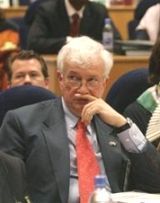Donors make new pledges to AU peacekeeping operation in Darfur
By ANTHONY MITCHELL
ADDIS ABABA, Ethiopia, May 26, 2005 (AP) — International donors pledged an additional $200 million Thursday to fund the African Union peacekeeping operation in Sudan’s western Darfur region during a conference to discuss the ongoing violence.

|
|
The US State Department’s senior representative for Sudan, Charles Snyder, during the donors conference in the AU Headquarters in Addis Ababa, Ethiopia, on Thursday, May 26, 2005. (Reuters). |
Canada made the largest new pledge, promising $134 million. The State Department’s senior representative on Sudan, Charles Snyder, said Washington was adding an additional $50 million to the $95 million already pledged to end what he called “acts of genocide” in the ongoing conflict.
The AU has 2,270 peacekeepers in western Sudan trying to stop the fighting between rebels and Arab militias. The AU plans to increase that number of troops to more than 12,300. The organization has asked for $723 million to help finance and equip the Darfur operation, but was $350 million short at the beginning of Thursday’s conference.
Snyder said the violence in Darfur was slowing, but that the only way to end it was to deploy a large AU force supported by NATO.
“The truth is the AU was looking for outside support and when you are looking at support on this kind of scale we need an organization that can do it, such as NATO,” Snyder told The Associated Press in the Ethiopian capital.
The peacekeeping operation is a critical test of international commitment and Africa’s resolve to end conflicts in the world’s poorest continent, the AU Commission Chairman Alpha Oumar Konare said.
“If Sudan were to collapse then the entire continent of Africa, with nine countries bordering Sudan, will also suffer and collapse,” he told the donors.
AU officials announced that Darfur peace talks would resume in Abuja, Nigeria on June 10.
“We are running a race against time,” said United Nations Secretary-General Kofi Annan, who was at the conference along with NATO Secretary General Jaap de Hoop Scheffer and European Union’s foreign policy chief Javier Solana.
“If violence and fear prevent the people of Darfur from planting and growing crops next year, then millions will have to be sustained by an epic relief effort,” Annan said.
At a meeting Monday in Brussels, EU nations offered air and ground transportation assistance as well as help with command planning, surveillance and housing for the AU’s Darfur peacekeepers. The EU will not send peacekeeping troops and will leave overall command of the operation to the African Union.
De Hoop Scheffer told the conference that NATO was ready to supply airlift capability and training for the AU peacekeepers.
“If you ask for help and we can help, we will help,” he said. “But the African Union has to remain in the driving seat.”
Solana said the EU was ready to support the political and military efforts to end the conflict, but did not provide any financial figures.
The North Atlantic Council of alliance ambassadors said they approved the “initial military options” for possible NATO support for the peacekeeping mission and said their efforts would center on military transport, training and planning.
The crisis in Darfur erupted when rebels took up arms against what they saw as years of state neglect and discrimination against Sudanese of African origin.
The government is accused of responding with a counterinsurgency campaign in which the ethnic Arab militia known as Janjaweed committed wide-scale abuses against ethnic Africans.
At least 180,000 people have died – many from hunger and disease – and about 2 million others have fled their homes.
